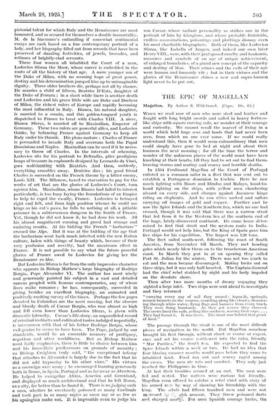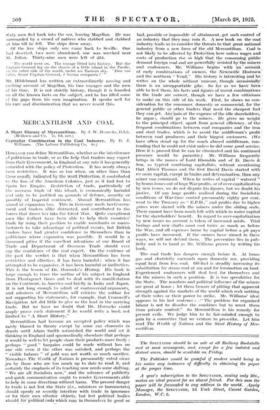THE EPIC OP MAGELLAN
Magellan. By Arthur S. Hildebrand. (Cape. 10s. 6d.) WEEN we read now of men who wore steel and leather and fought with long bright swords and sailed in heavy fortress-. like ships with square curving sails, we wonder at their courage and curiosity. We cannot recall the marvel of living in a world which held huge seas and lands that had never been seen, from which no one ever came. If we could really understand this, then it would seem extraordinary that men could simply have gone to bed at night and about their business the next morning ; for all the time the terror and wonder of the unknown places of the world must have been knocking at their hearts, till they had to set out to find them, braving storms and mutiny and scurvy and horrible deaths.
In 1504 Ferdinand Magellan of the Court of Portugal enlisted as a common sailor in a fleet that was sent out to establish a Portuguese dominion in Cochin. Here he saw much fighting with Moors and Hindus and Malays, hand-to- hand fighting on the ships, with yellow men clambering aboard on every side, and charges against Javanese kings riding on elephants: And he saw cities sacked and sailors carrying off images of gold and copper. Further east he saw the Spice Islands and the Southern Sea, which no one had crossed, though it was said that there was a narrow strait that led from it to the Western Sea at the southern end of the huge, lately-discovered continent. He came home deter- mined to find that strait and the western route to India. Portugal would not help him, but the King of Spain gave him five ships for his expedition. The largest was 120 tons.
The fleet sailed south-west, following the coast of South America, from November till March. They met howling gales which nearly blew them on to the treacherous American coast. In March they put in at an opening they smiled Port St. Julian for the winter. There was not too much to cat and the men became discouraged. Mutiny broke out on three ships, but it was only half-hearted. The Captain-General had the chief rebel stabbed by night and his body impaled on the desolate shore.
Then after two more months of dreary voyaging they sighted a large inlet. Two ships were sent ahead to investigate and they returned "carrying every rag of sail they owned topsa ils, spritsails, mizzen bonnets on the courses, crowding along like cloud s, thunder- ing through white water, flying flags and banners from every truck. They were firing bombards. As they got nearer they cheered. The crews lined the rails, yelling like madmen, waving their caps. .. . They had found it. It was there. The strait was behind that point of land."
The passage through the strait is one of the most difficult pieces of navigation in the world. But Magellan somehow brought his fleet through, without chart or course or experi. ence and set his course north-west into the calm, friendly Mar Pacifico," the South Sm. Ile expected to find the Spice Islands within a week or two. He had no idea that four blazing summer months would pass before they came to inhabited land. Food ran out and scurvy raged among the crews. The men ate rats and sawdust. They only, just reached the Philippines in time.
At last their troubles seemed at an end. The men were fed and rested. The natives were curious but friendly. Magellan even offered to subdue a rebel chief with sixty of his armed mm by way of showing his friendship with the king. The rebels had fifteen hundred men and were not m?ressed by S:2 _nisi' armour. They threw poisoned darts and charged madly. For once Spanish courage broke, the
sixty .men fled back into the sea, leaving Magellan. He was surrounded by a crowd of natives who stabbed and Stabbed at him till he fell. The ships drew away. Of the five ships only one 'came back to Seville. One had deserted, two were abandoned, one was wrecked near St. Julian. Thirty-nine men were left of 234.
" The world went on. The voyage fitted into history. But the Captain-General lay on the shores of a little island in the Pacific, ' on the other side of the world, under an Postern sky. Dios vos • salve, Senor Capitan-General, a buena eompania ! ' ".
Mr. Hildebrand has written an extraordinarily moving and exciting account of Magellan, his two voyages and the men of his time. It is not strictly history, though it is founded
on all the known facts on the subject, and he has filled some of the gaps from his own imagination. It speaks. well for his care and discrimination that we never resent this.















































 Previous page
Previous page